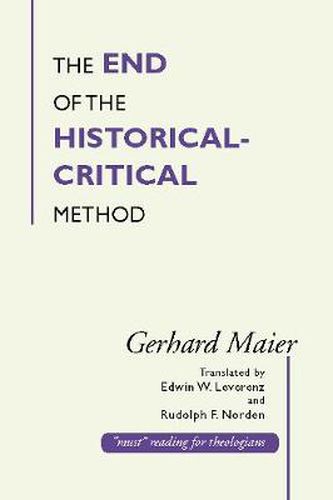Readings Newsletter
Become a Readings Member to make your shopping experience even easier.
Sign in or sign up for free!
You’re not far away from qualifying for FREE standard shipping within Australia
You’ve qualified for FREE standard shipping within Australia
The cart is loading…






The historical-critical method of biblical interpretation has dominated theological thinking for over two centuries. It has been the subject of much controversy, including the turmoil in American Lutheranism. But now the historical-critical method has come to a dead end. So says Dr. Gerhard Maier, author of the original version of this work. Maier points out that the emphasis in the historical-critical method has consistently been on the critical rather than the historical. He goes on to delineate the historical-biblical method he feels will be needed in the future. Such a method takes history seriously but allows for God’s supernatural intervention in human affairs. Here Edwin Leverenz and Rudolph Norden present the English translation of Maier’s manuscript, while Eugene Klug’s preface places the study into the setting of today’s theological debate. The End of the Historical Critical-Method is must reading for theologians. Yet it also serves as a help to all who have been searching for guidance in combating rationalism in the approach to theology.
$9.00 standard shipping within Australia
FREE standard shipping within Australia for orders over $100.00
Express & International shipping calculated at checkout
The historical-critical method of biblical interpretation has dominated theological thinking for over two centuries. It has been the subject of much controversy, including the turmoil in American Lutheranism. But now the historical-critical method has come to a dead end. So says Dr. Gerhard Maier, author of the original version of this work. Maier points out that the emphasis in the historical-critical method has consistently been on the critical rather than the historical. He goes on to delineate the historical-biblical method he feels will be needed in the future. Such a method takes history seriously but allows for God’s supernatural intervention in human affairs. Here Edwin Leverenz and Rudolph Norden present the English translation of Maier’s manuscript, while Eugene Klug’s preface places the study into the setting of today’s theological debate. The End of the Historical Critical-Method is must reading for theologians. Yet it also serves as a help to all who have been searching for guidance in combating rationalism in the approach to theology.